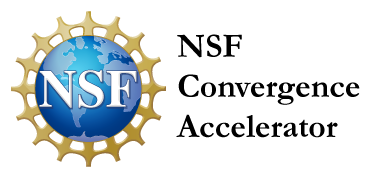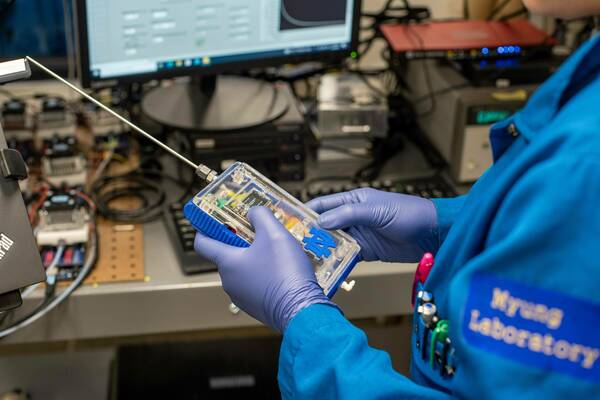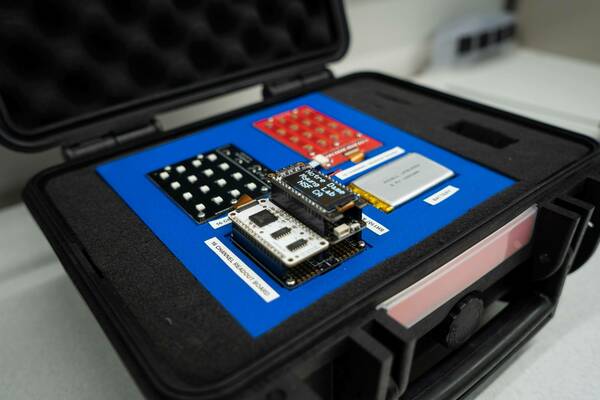Notre Dame researchers to develop electronic nose for rapid disease detection

The U.S. National Science Foundation (NSF) Convergence Accelerator Program has awarded $650,000 to the University of Notre Dame to support the development of an advanced electronic nose that researchers say could help prevent the next pandemic.
“Human health is linked with animal health, and we saw during the COVID-19 pandemic what can happen when a disease passes from animals to humans and continues to spread uncontained,” explained Nosang V. Myung, the Bernard Keating-Crawford Endowed Professor in the Department of Chemical and Biomolecular Engineering.
Myung, who also directs the micro- and nanoscale biomedical instrumentation theme at the Berthiaume Institute for Precision Health, will lead the development of the new technology. His team is one of 16 teams awarded under Track L: Real-World Chemical Sensing Applications.
Myung said the electronic nose will build on existing technologies developed in his lab at Notre Dame. It will complement conventional disease prevention and management approaches by adding real-time disease monitoring.

To build the device, Myung and his team of collaborators will develop new, high-sensitivity materials using nano-engineering processes. Still, Myung says the device will be portable and affordable, so it can be used on-site by farmers, packing plant inspectors, animal husbandry technicians, and others.
“The idea is to use data to make critical decisions quickly—to isolate or treat infected animals, for example—to minimize the spread of diseases,” Myung explained.
During the project’s first phase, Myung and his collaborators will equip the electronic nose to detect avian flu, which resulted in over 40 million animal deaths and over $2.5 billion in economic losses during a 2022 outbreak. The researchers will gather data from infected birds and healthy birds and will employ machine-learning techniques to train the electronic nose to distinguish between the two.
At the same time, Emily Stoler, assistant director of risk assessment at Notre Dame’s IDEA Center, will, together with Myung and his team, evaluate and pursue potential commercial opportunities associated with the electronic nose technology.
During the project’s second phase, the researchers will train the electronic nose to detect an array of other infections, both in animals and in humans. The end result will be a flexible monitoring system that can be taken to sites where infections are most likely to occur or spread.
Finally, the researchers will develop a user-friendly graphic interface that allows users to operate the device wirelessly using a smartphone and see results in real time.

Although it has been two decades since a landmark experiment found that dogs were effective at using smell to detect human bladder cancer, the use of smell for disease diagnosis remains rare. Myung said the new device has the potential to show that smell is a valuable surveillance technique that can be affordable, accessible, and also highly sensitive. The team projects that the electronic nose will be capable of detecting smells at a sensitivity of one part per billion.
The academic collaborators who will join Myung in developing the electronic nose technology include:
- Richard Bowen, a professor of reproductive biology and virology at Colorado State University. Bowen also directs the Animal Models Core of the Rocky Mountain Regional Center of Excellence for Biodefense and Emerging Infectious Disease.
- Yamil Colón, assistant professor in Notre Dame’s Department of Chemical and Biomolecular Engineering. Colón is an expert in computational materials discovery and design.
- Bruce Kimball, a chemical ecologist at the Monell Chemical Senses Center. Monell is an independent non-profit scientific institute dedicated to interdisciplinary basic research on taste and smell.
To learn more, please visit myung-lab.com.
Contact:
Brett Beasley / Writer and Editorial Program Manager
Notre Dame Research / University of Notre Dame
bbeasle1@nd.edu / +1 574-631-8183
research.nd.edu / @UNDResearch
About the NSF Convergence Accelerator:
Launched in 2019, the NSF Convergence Accelerator builds upon basic research and discovery to accelerate solutions toward societal impact. The program funds teams to solve societal challenges through convergence research and innovation. To enhance its impact, the Accelerator also places teams together in cohorts, synergizing their work through facilitated collaboration.
About Notre Dame Research:
The University of Notre Dame is a private research and teaching university inspired by its Catholic mission. Located in South Bend, Indiana, its researchers are advancing human understanding through research, scholarship, education, and creative endeavor in order to be a repository for knowledge and a powerful means for doing good in the world. For more information, please see research.nd.edu or @UNDResearch.
Latest Research
- Seven engineering faculty named collegiate professorsSeven faculty members in the Notre Dame College of Engineering have been named collegiate professors—a prestigious title awarded by the university and college in recognition of excellence in research, teaching and service. The designation may be conferred on faculty at the assistant, associate or…
- ‘A special challenge’: German studies scholar wins National Humanities Center fellowship for research on medieval womenFor CJ Jones, the joy of research is not the answers but the journey. And the next step on that journey is a fellowship with the National Humanities Center. …
- Notre Dame Lead Innovation Team partners with local WIC program to identify, prevent lead poisoning in childrenB.A.B.E. store “shoppers” now have something new to help their families: free lead screening kits offered by the University of Notre Dame’s Lead Innovation Team.
- Notre Dame Welcomes Ninth Cohort of Warrior-Scholars for Transformative Academic JourneyNOTRE DAME, IN – The University of Notre Dame recently concluded its ninth successful Warrior-Scholar Project (WSP) boot camp, hosting 34 dedicated Warrior-Scholars from June 21st to 28th. This intensive, week-long academic residency provided transitioning service members and veterans…
- Entrepreneurship and Empowerment in South Africa study abroad program celebrates 25 yearsThis year, the Entrepreneurship and Empowerment in South Africa (EESA) program marked its 25th year of operation. EESA is a six-week summer study abroad program that enables students to help historically…
- Vatican honors Martin and Carmel Naughton with papal awardCarmel…













